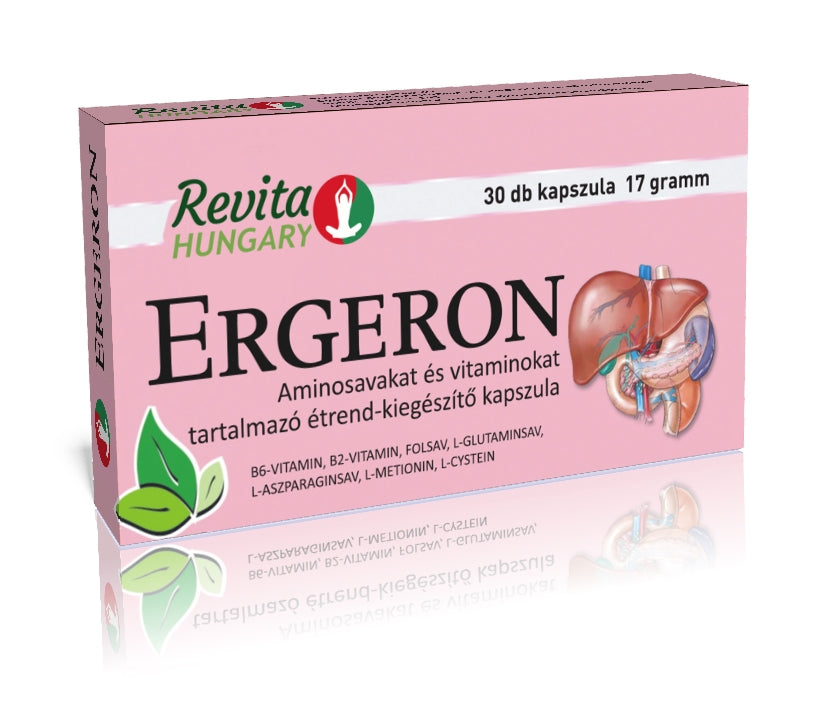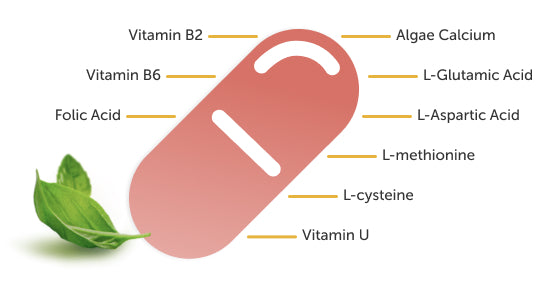Ergeron
Ergeron
Couldn't load pickup availability
Share


DESCRIPTION
In the course of our research work over the past 8-10 years, we have been working on the development of a preparation that primarily supports the functioning of the liver and its functions. We were primarily looking for amino acid compositions that are already mentioned in the literature as active ingredients for regenerating or improving liver functions. We found a molecule not yet known or used in the literature, which fitted our research goals in an extraordinary and efficient way.
The active ingredient is the so-called Vitamin U, chemically S-methyl methionine. The use of this active ingredient for therapeutic and other purposes is protected by its own international patent. The final composition of the preparation was tested in preclinical (animal) experiments, primarily in studies of hepatotoxic side effects of several antitumor agents.
With the involvement of specialists, the preparation was also tested in liver toxicosis of various origins. The changes were checked with instrumental diagnostics (ultrasound, CT, etc.) and by monitoring blood chemistry parameters. The most noticeable improvement was found in patients with confirmed hepatitis C infectious hepatitis.
Active ingredient experiences:
Vitamin U (S-methylmethionine):
Vitamin U, S-methyl methionine, is an excellent radical scavenger, i.e. antioxidant. It exerts its effects in several places, primarily at the cell interfaces. In these places, it transforms molecules that cannot or are difficult to eliminate from the body so that they can be excreted as metabolites. With this activity, it promotes the influx of molecules into the cell, which are necessary for "good" cell construction. The so-called pure molecules, in this case the amino acids take part in DNA synthesis inside the cell. This process is safer, the fewer the metabolites and fragmented molecules that are difficult to empty around the cell membranes. It has already been proven by previous researches (Russian biochemists) that the active - S - and active methyl groups of vitamin U mark metabolites that are difficult to be excreted with these groups, and the metabolites become recognizable and are excreted faster. If these reactions do not take place in the absence of vitamin U, there is a high chance that the unwanted molecules mentioned above will enter the cells through the membrane and change the amino acid sequence of the new cell during cell division. This prevents healthy cells from regenerating by division. Thinking through this series of reactions, it is easy to see that vitamin U not only plays an important role in cell regeneration, but also reduces the risk of tumor cell formation.
– Vitamin U carries out the "cleaning" activity on the surface of the cells, thus preventing the development of metastasis in cancer patients.
– It acts as a carrier for fat-soluble vitamins, as well as for selenium and β-carotene. That is, it helps their absorption and leads them all the way to the place of use.
– It also strengthens the immune system by filling the way for the construction of proteins important in immunity with its cleansing activity.
L-cysteine:
In hypoxic and edematous conditions (especially in the case of the brain), the cell membrane is damaged, as a result of which the cell plasma flows out of the cell, which further worsens the condition. The SH group of L-cysteine is capable of regenerating the cell membrane, restoring permeability conditions, as a result of which hypoxia and edema are reduced. The substance is also an excellent antioxidant. In cancer metastases, the cells are always hypoxic.
As a primary anti-toxin and cell membrane stabilizer, L-cysteine helps neutralize the byproducts of fat and alcohol digestion and protects our body from the harmful effects of chemotherapy, tobacco smoke, heavy metals and many other substances. In Europe, it is used with great success in cases of acetaminophen poisoning. Its liver protective effects can also make it useful in the treatment of other liver problems.
Glutathione:
Its molecule is made up of three amino acids: cysteine, glutamine and glycine. Among these, cysteine is the one that can be the limiting factor for glutathione formation, that is, the supply of cysteine determines how much glutathione our liver can synthesize. Thus, it is understandable that the external replacement of cysteine is the most important factor contributing to the synthesis of glutathione and increasing its level. Glutathione conjugation is the process in which 60% of toxic substances are bound in the liver (in phase II of the detoxification process). Its effectiveness contributes to the fact that toxins do not accumulate in the liver. In addition, cysteine is also an effective antioxidant, which provides additional protection for liver cells.
L-glutamic acid:
It is able to bind excess nitrogen in the cerebral circulation, as a result of which the brain functions better. Its effectiveness depends on the glucose level. It can revive hypoglycemic patients in an insulin coma at a lower glucose level than if only glucose were used for the fermentation. L-glutamic acid reduces sugar cravings. It helps to remove ammonia from our body, while increasing the level of some strong antioxidants, so it also plays a role in detoxifying the body (e.g. during alcohol withdrawal cures).
L-aspartic acid:
L-aspartic acid is an amino acid that supports the optimal functioning of cells. In cancer patients, it is quickly depleted and must be replaced. When L-glutamic acid is dosed in the right proportion with L-aspartic acid, it reduces the level of its own protein breakdown, thereby promoting and accelerating the body's regeneration after mental and physical fatigue.
Ornithine:
It helps the immune system function. It removes ammonia from our body, thus promoting regeneration. It also plays a role in the regeneration of the liver, as it helps detoxify harmful substances and increases the body's ability to defend itself against toxins. The level of ornithine decreases in the body during growth, trauma, and injuries and can help in regeneration when we adapt to stress. Based on research, ornithine also promotes wound healing.
Methionine:
It is one of the building blocks of proteins, a strong antioxidant that protects the tissues of our body from destructive free radicals - it helps build muscles, prevents their breakdown, helps maintain the elasticity and health of the skin, and strengthens and protects hair and nails. Based on research, methionine can be useful in the treatment of alcoholism and in regeneration. Methionine is an essential amino acid, which, like other amino acids, is one of the building blocks of proteins. It also plays a key role in the formation of RNA and DNA, and is also a strong antioxidant, protecting against destructive free radicals (especially those associated with alcohol).
Those on a high-fat diet may benefit from consuming methionine because it helps break down fats; it improves the liver's ability to produce lecithin, and lecithin prevents the accumulation of dangerous cholesterol in the blood vessels, thus reducing the risk of heart disease and gallstone formation. Since it can also be converted into cysteine, methionine can also play a role in the neutralization of toxins.
Recommended consumption:
1 capsule daily. Consult your doctor about a dose different from the recommended consumption amount. Do not consume more than the recommended amount of the product. The consumption of dietary supplement products does not replace a varied and correct diet.
The consumption of the product is recommended in the following cases:
– Viral infectious hepatitis (Hepatitis A, B, or C)
– Liver damage caused by medication side effects
– To prevent liver-damaging side effects of chemotherapy preparations
– Alcohol addiction or liver damage caused by a lot of alcohol
– In case of other acquired liver damage


